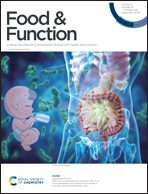The gut microbiota mediates the protective effects of anserine supplementation on hyperuricaemia and associated renal inflammation†
Abstract
Hyperuricaemia is a disease associated with elevated serum uric acid content, which has emerged rapidly in recent decades. The drugs used to treat clinical hyperuricaemia have side effects, and their safety is poor. However, anserine is a natural carnosine derivative that shows an anti-hyperuricaemic effect. A previous study demonstrated that anserine inhibits uric acid synthesis and promotes uric acid excretion, but there is no evidence regarding the effect of anserine from the perspective of the gut microbiota. In this study, the anti-hyperuricaemic and anti-inflammatory effects of anserine were explored in a diet-induced hyperuricaemic mouse model. Anserine alleviated hyperuricaemia and renal inflammation phenotypes, inhibited uric acid biosynthesis, promoted uric acid excretion, and inhibited NLRP3 inflammasome and TLR4/MyD88/NF-κB signalling pathway activation. The results showed that the anti-hyperuricaemic effect of anserine was dependent on the gut microbiota in the germ-free mice experiment. Furthermore, anserine treatment reversed gut microbiota dysbiosis, repaired the intestinal epithelial barrier and increased short-chain fatty acid production. Moreover, the anti-hyperuricaemic effect of anserine was transmissible by transplanting the faecal microbiota from anserine-treated mice, indicating that the protective effects were at least partially mediated by the gut microbiota. Thus, we identified a new and safe prebiotic material to alleviate hyperuricaemia and provided ideas for the development of oligopeptides.



 Please wait while we load your content...
Please wait while we load your content...